JUN 24, 2025. Meeting with Bhutan Material Suppliers and Finance Minister, Departure from Bhutan
Hello. Today marks the end of Sunim’s schedule in Bhutan as he returns to South Korea via Bangkok.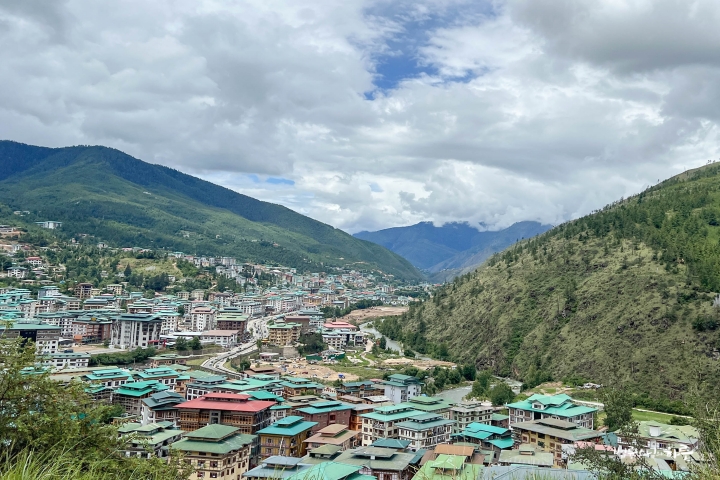
After completing morning practice and meditation, Sunim had breakfast at 6 AM at Rinchen Dawa’s house, where Korean volunteers had lovingly prepared boiled rice and seaweed soup.
Originally, a meeting was scheduled at 8 AM with Karma Tshiteem, Chairman of the Royal Civil Service Commission and former Chairman of the GNH (Gross National Happiness) Commission. However, Mr. Tshiteem received urgent work instructions from His Majesty the King and had to travel to another city, so the meeting was unfortunately canceled. After breakfast, Sunim held a meeting with JTS volunteers starting at 7 AM.
While evaluating the results of the workshops conducted in Trongsa and Zhemgang, they carefully reviewed the tasks that needed to be prepared going forward. Sunim first discussed the items that volunteers needed to take care of.
“To start the main project from the second half of this year, the materials we need to purchase in bulk are roofing materials, cement, pipes, wire mesh, and electrical wires. For bulk purchases, buying at factory prices will be the most economical. So we need to find out how to purchase these materials at reasonable prices. As for wood, gravel, and sand, we should enable residents to source these locally from their villages as much as possible.”
“Yes, we’ll start researching from now.”
They then discussed various topics for about an hour and a half, including methods for transporting and storing materials in each village, securing technicians for housing improvement projects, communication methods with Bhutanese officials, and determining priorities for requested projects.
After finishing the meeting, Sunim headed to Sanmaru Restaurant in downtown Thimphu at 9:30 AM. He met with Penchol from Perfect Builder’s Store Limited, a Bhutanese material supplier. Penchol is the company representative of former National Assembly Speaker Dasho Passang, with whom Sunim had formed a connection at the Mahabodhi Society in India, and jointly operates a major material supply company in Bhutan. Perfect Builder produces major construction materials such as steel, roofing materials, fencing materials, fiber, and aluminum window frames, and is also capable of manufacturing electrical wires and providing technical support. Since many materials will be needed to fully implement sustainable development projects in Bhutan, Sunim had extensive discussions with Penchol about material procurement and transportation plans.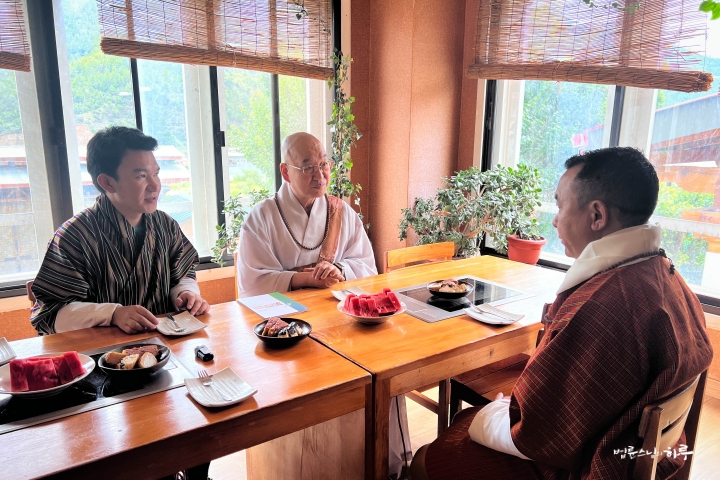
Penchol first introduced the company.
“Sunim, on behalf of our organization, I sincerely thank you for supporting the poor in remote areas of Bhutan. Our company has its headquarters in Phuentsholing with branches in Gelephu, Thimphu, Paro, and Wangdue. Material delivery from Gelephu to Zhemgang should be particularly smooth. Since most of our staff are engineers, we can also provide technical support.”
After explaining JTS’s project principles, Sunim shared his thoughts on methods for delivering materials to residents.
“Since our goal is housing improvement for the poor, we need moderate quality materials rather than high-end ones. While the construction areas are in the Chiwogs, materials only need to be supplied up to Gewog. Before construction begins, JTS first provides one or two days of training to village residents. Since most residents build using traditional methods, technical training will enable them to build houses much more efficiently.” 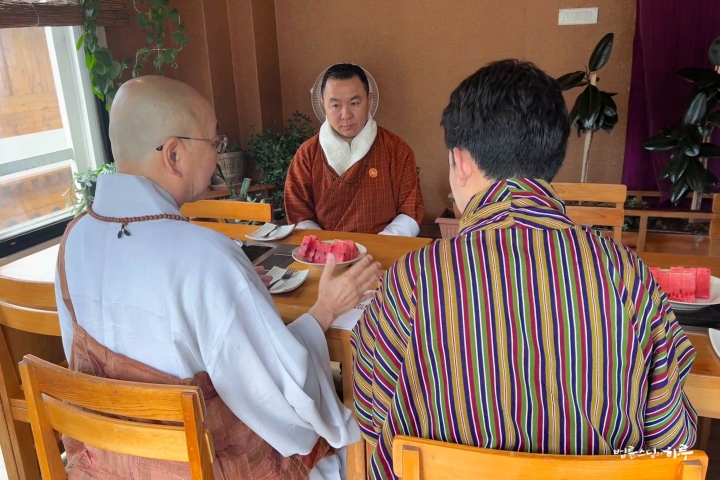
After the conversation, at 11 AM they visited the Perfect Builder Thimphu branch to tour the store directly. They had most of the materials needed for construction. When Penchol requested a blessing from Sunim, Sunim walked through the entire store giving blessings.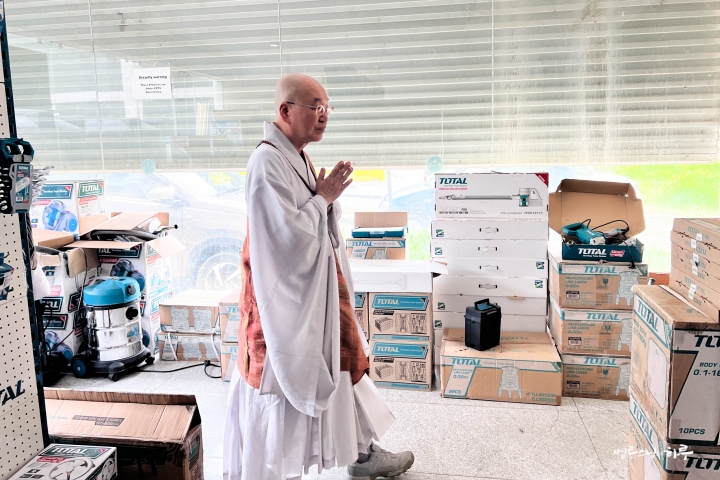
At 11:30 AM, Sunim went to the Cabinet Office to meet Bhutan’s Finance Minister Lekey Dorji. Lekey Dorji was from Zhemgang, where the sustainable development project is being implemented.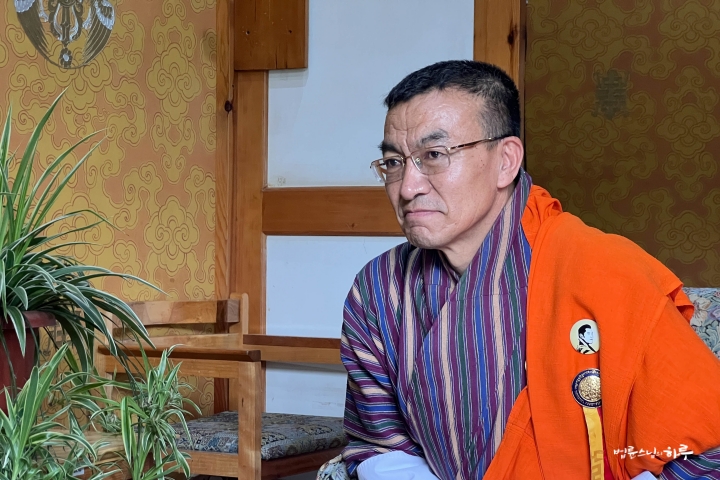
“I heard that Sunim is conducting many activities in Zhemgang. Not only I but also the current Speaker of the National Assembly is from Zhemgang, so I really wanted to meet you and express our gratitude. Thank you so much for meeting with us.”
The Finance Minister was also very interested in Buddhism. While discussing Buddha’s fundamental teachings, the Speaker of the National Assembly also joined them for the conversation.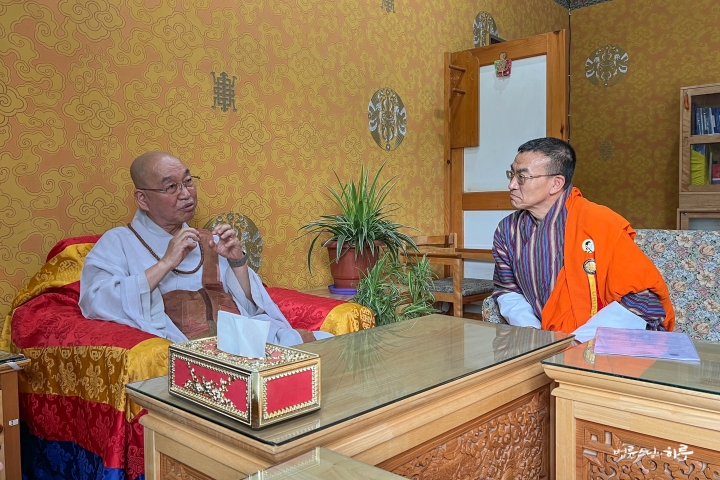
During this conversation, they received an unexpected call. It was a request to confirm Sunim’s departure flight time from Bhutan. They had originally understood it to be a Bangkok-bound flight departing at 4:20 PM, but a few days earlier an email had been sent notifying that the departure time had been changed to 1:20 PM. This information hadn’t been passed along, so they only learned about it during the meeting. Sunim called Dr. Tashi, with whom he was supposed to have lunch, to apologize, and also called the owner of Sanmaru Restaurant who had prepared the meal to express his regret. He also hastily said farewell to the JTS volunteers.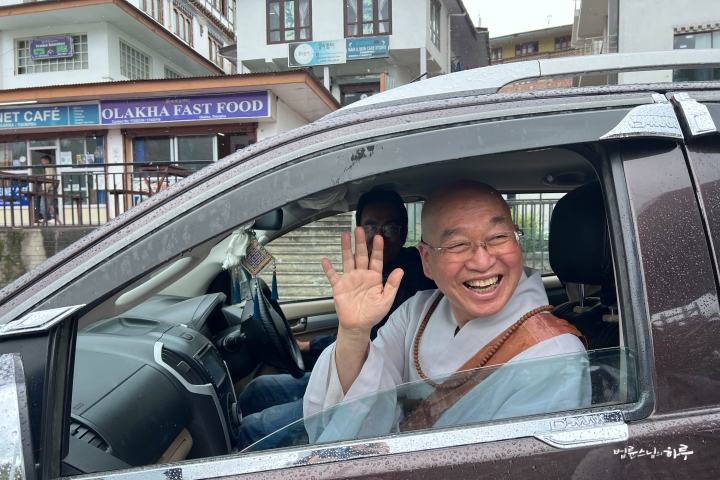
“Have a safe trip, Sunim.”
“I was wondering why we had extra time this morning, and now this happens.” (laughs)
Sunim hurriedly packed his belongings and departed for Paro Airport. Due to the time constraint, a skilled driver friend of Rinchen Dawa drove them to the airport. The Cabinet Secretariat requested the airport to delay the flight departure slightly, and after much difficulty, Sunim barely managed to board the flight to Bangkok.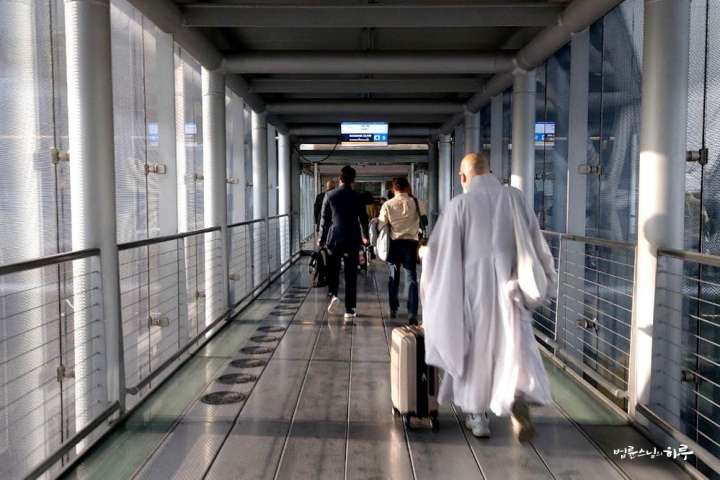
Passing over snow-capped mountains, they arrived at Bangkok Airport at 5:30 PM local time in Thailand. Hwang So-yeon, a member of the Bangkok group of Jungto Society, came to meet them and helped with immigration procedures.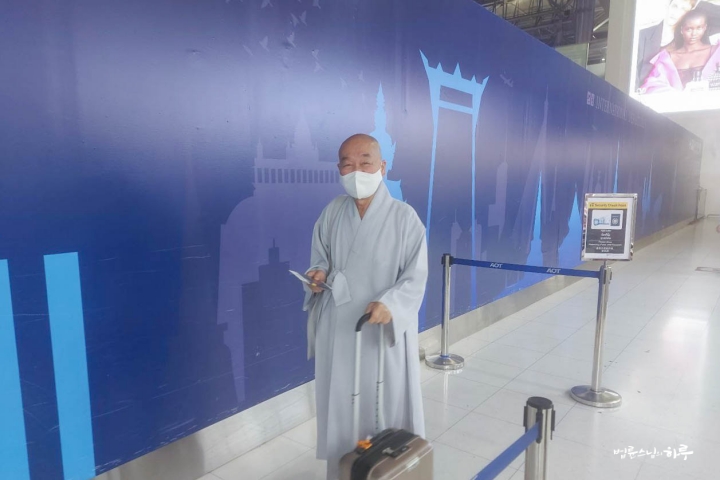
After waiting about 5 hours at Bangkok Airport, Sunim departed Bangkok Airport at 11:10 PM heading for Incheon Airport.
Tomorrow, Sunim will arrive at Incheon Airport at 6:35 AM and move to the Jungto Social and Cultural Center. In the morning, he will attend the Religious Leaders’ Meeting for National Reconciliation and Peace and conduct a live broadcast of the morning Weekly Dharma Assembly. In the afternoon, he will attend the Peace Foundation Planning Committee meeting, and in the evening, he will conduct a live broadcast of the evening Weekly Dharma Assembly.
Since there was no Dharma talk today, I’ll conclude by sharing a dialogue between a questioner and Sunim from the online Weekly Dharma Assembly conducted in Bhutan on the 18th.
Do I Need to Be Born a Prince Like Buddha and Experience Everything to Achieve Enlightenment?
“Some people become aware that ‘drugs are really dangerous’ after trying drugs and going through addiction, but there are also those who become addicted after trying drugs once and can never escape. There are people who have never tried drugs and have no interest in them, and there are cases where people can’t let go of their attachment after trying drugs once and eventually become addicts.
Some people who were beaten as children feel ‘violence is really bad’ and adopt non-violent attitudes, while others have the memory of being beaten remain as trauma and develop the habit of hitting their own children. There are people who raise their children without hitting them because they were never hit and don’t know violence, and there are cases where people hit their children precisely because they’ve never been hit and don’t know what it’s like to be hit.
Buddha said that humans have four tendencies. There are people who go from bright places to dark places, and people who go from bright places to bright places. There are people who go from dark places to bright places, and people who go from dark places to even darker places. For example, some people born into wealthy families give generously without being stingy, while others grow up in wealthy families not knowing hardship and live like spoiled brats. Some people born into poor families understand and help poor people because they experienced hardship firsthand, but conversely, some people only look out for themselves due to wounds from poverty. All four of these cases exist.
However, on average, only one or two out of a hundred people who do drugs completely break free. Far more people who have tried drugs cannot quit. Similarly, it’s extremely rare for someone born into difficult family circumstances to overcome those difficulties and care for others in need. There are people like South Africa’s President Nelson Mandela who spent decades in prison and didn’t seek political revenge, but there are also those whose experiences of suffering lead them to carry out political revenge even more strongly.
Those who have actually enjoyed pleasures and then said they were meaningless include not only Buddha but also some others like Yasa Bhikkhu. But what about the probability? The probability of someone who has tasted pleasure escaping from it is very low. The vast majority are those who cannot escape from pleasure precisely because they have enjoyed it. Similarly, those who grew up in poverty and therefore understand poor people, live sincerely, and give to others are a minority. Rather, the majority grow up to be more selfish and self-centered because they grew up poor. The majority also grow up to be self-centered because they grew up affluent. Of course, there are exceptions. Occasionally there are people who, thanks to growing up wealthy, have generous personalities that embrace everyone without particular wounds.
Buddha was born as a prince in conditions where he could enjoy all kinds of pleasures, yet he renounced everything, became a monk, and lived frugally his entire life. People who live such lives are very rare examples. Among the people I’ve met was a third-generation chaebol youth who wanted to walk the path of a practitioner instead of inheriting his father’s business. Such people exist even today, but they are still very rare cases.
You have a deep inner desire to enjoy pleasures. You’re thinking, ‘Since Buddha also thoroughly enjoyed desires before uprooting them, shouldn’t I live that way too?’ I fully understand that feeling. But can you really escape from pleasure after enjoying it? Not necessarily. Rather, people who don’t approach pleasure have a higher probability of escaping from it. Of course, we can’t definitively say that those who haven’t approached pleasure will necessarily escape from it.
Among the Rinpoches of Tibet, Bhutan, and Nepal, there are cases where they are recognized as reincarnations from childhood and grow up like princes. People come to bow to them when they’re only three or four years old. They believe these children were teachers in their previous lives. Among those who grow up this way, there are examples who become corrupted and obsessed with money, commit sexual harassment, or become arrogant. Conversely, there are cases like the Dalai Lama who grow up admirably. While those who grow up in good environments from childhood and receive good education have a higher probability of growing up properly, some still turn out badly. The outcome is not predetermined.
On average, the less exposed to bad things, the lower the probability of being influenced by them, and the more good education received, the higher the probability of growing up properly. I didn’t attend university and didn’t study abroad. So I can say ‘There is a path even without going to university or studying abroad.’ However, it’s not right to interpret this as ‘Practitioners shouldn’t go to university or study abroad.’
While it’s difficult for saints to emerge from poor environments, it’s also very difficult for saints to emerge from excessively good conditions. Buddha’s greatness lies in the fact that even in such circumstances, he wasn’t influenced by his environment but awakened and freed himself from ignorance. Also, Buddha experienced both extreme asceticism and extreme pleasure because he didn’t know the path. However, we’ve learned through Buddha that we shouldn’t go down such paths. If you still say ‘I need to experience it myself,’ you may do so. But then, why would we need to learn Buddha’s teachings? We could just experience everything directly and realize it ourselves.
What you’re saying is partially correct, and it could actually have such effects. However, such cases are very few. Learning from the wisdom of saints is the wise path. There’s no need to confirm ‘this is poison’ by actually consuming poison. If we had to experience everything directly, we would have to repeat from the beginning all the experiences humanity has accumulated over ten thousand years of history. That would be too reckless.”
“When you said I might be having these thoughts because I have desires to pursue, I had an ‘Ah!’ moment. And when you said that if I insist on going down both paths even though Buddha has already traveled them, then there’s no point in learning Buddha’s teachings, I realized my attitude toward learning was somewhat lacking.”
“For someone struggling with forced restraint, it might be necessary to say ‘You’ll realize something if you experience it directly.’ While it’s better not to eat instant noodles, if someone’s wish is to try them just once, we might say go ahead and try once. If there are no major side effects, that’s fine. But if it’s poison, that’s a different story. If we tell someone to ‘try it to know’ when it’s poison, the consequences cannot be reversed.”
“I understand well. Thank you.”





